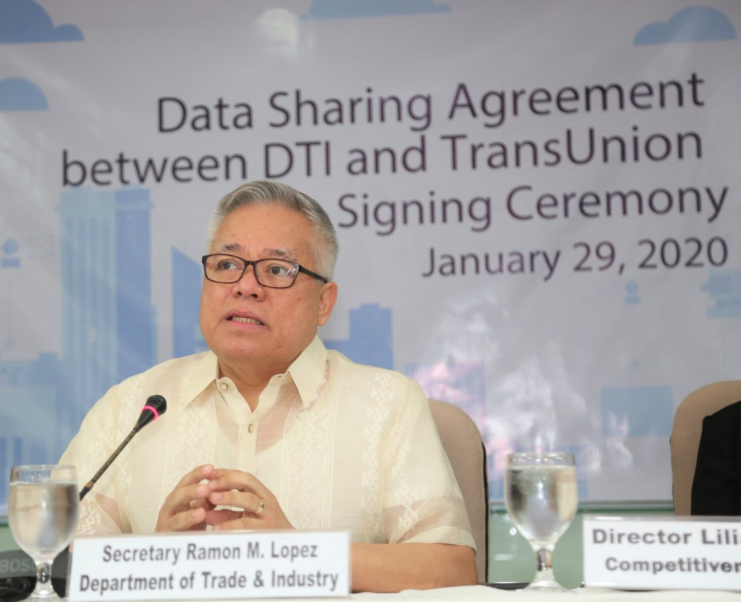
29 January 2020, BOI Penthouse
Today’s signing of the data-sharing agreement between the Department of Trade and Industry (DTI) and TransUnion Philippines is part of the government’s continuing effort to improve our competitiveness ranking. More importantly, this agreement will improve access for Micro, Small, and Medium Enterprises (MSMEs) when it comes to their access to microfinancing.
Last year, we reported the country’s huge jump from 124th to 95th rank in the Doing Business (DB) 2020 report. Notable is the improvement on the topic “Getting Credit,” where the Philippines posted +52 notches, increasing our rank from 184th place to 132nd over 190 countries.
This is due to the World Bank’s (WB) acceptance of the Philippine government’s data correction request. We acknowledge with thanks the cooperation of all our credit bureaus, particularly our partner today, TransUnion Philippines, led by Ms. Pia Arellano, in helping us with this achievement.
The DB 2020 report further confirmed that TransUnion is the largest credit bureau in the country, with 8.47 million adult population in its database. This represents 13.5% of the total adult population in the Philippines, exceeding the 5% WB threshold. This resulted in a 35-point increase in the Philippines’ score from a very low 5.0 in 2019 to 40.00 in 2020.
The Philippines’ score on depth of credit information hit 7 out of 8 because TransUnion was able to show that the credit bureau:
- Distributes both positive and negative credit data;
- Data from retailers or utility companies, in addition to data from banks and financial institutions are distributed;
- Distributes 2 years of historical data;
- Distributes data on loan amounts below 1% of income per capita;
- By law, borrowers have the right to access their data in the credit bureau;
- Banks and financial institutions access borrower’s credit information online; and,
- Credit scores are offered as a value-added service to help banks and financial institutions assess the credit worthiness of borrowers
We were only unable to address the first question in this category, which was: “Are data on both firms and individuals distributed.” Through this agreement, we will now address this point.
With our reform initiatives, DTI deems it to be in the best interest of our nation to share only “Publicly Available Data” that we have in our possession. This refers to the database of the list of business enterprises given licenses to operate. Specifically, these are Mayor’s Permits issued by Local Government Units (LGU) that participated in the 2018 and 2019 Cities and Municipalities Competitiveness Index (CMCI). So ito ‘yung Annual natin na CMCI. And we have a database we basically enter into an agreement to share
this database so that we can help in the access of the MSMEs to microfinancing as well to improve the our Competitiveness ranking.
As such, these are the salient points of the agreement:
- DTI will share only publicly available data, which includes the business name, owner’s name, business address, type, and date of registration;
- TransUnion will now be able to build its “firm bureau database” in which personal data from its member banks/ financial institutions shall be used to match and merge with publicly available data provided by DTI;
- TransUnion shall secure the necessary consent of sole proprietors over the collection and processing of personal data, and that they are apprised with the nature, purpose, and extend of the processing done; and,
- DTI shall benefit from the customized analytics solutions, using publicly available data it provides to TransUnion, and anonymized data; we shall use the information in policy formulation and program development to improve access to credit by MSMEs.
While we expect the information, we share to redound to additional points in the DB 2021 survey, we need to realize the greater importance of credit information to facilitate access to credit by MSMEs. We also need to understand the important role of credit bureaus, such as TransUnion, to facilitate information between borrowers and lenders.
As the World Bank notes: “By sharing credit information, credit bureaus help to reduce information asymmetries, increase access to credit for small firms, lower interest rates, improve borrower discipline and support bank supervision and credit risk monitoring.”
I hope that this partnership with TransUnion will extend from competitiveness ranking to promoting greater access to credit for our people. This, in turn, will help our MSMEs with financing, whether setting up a business or with expansion.
Further, this agreement is DTI’s contribution to the reform initiatives for the DB 2021. As we are now expecting DB 2021 to commence next month, we are confident that this agreement with TransUnion will bear immediate results. DTI continues to support the Anti-Red Tape Authority (ARTA), which is now spearheading implementation of reforms for the next cycle.
All these efforts—improving our country’s competitiveness, giving our MSMEs greater access to credit, or improving ease of doing business—shows the Duterte administration’s commitment in giving our people a better quality of life.
Thank you and Good morning!


